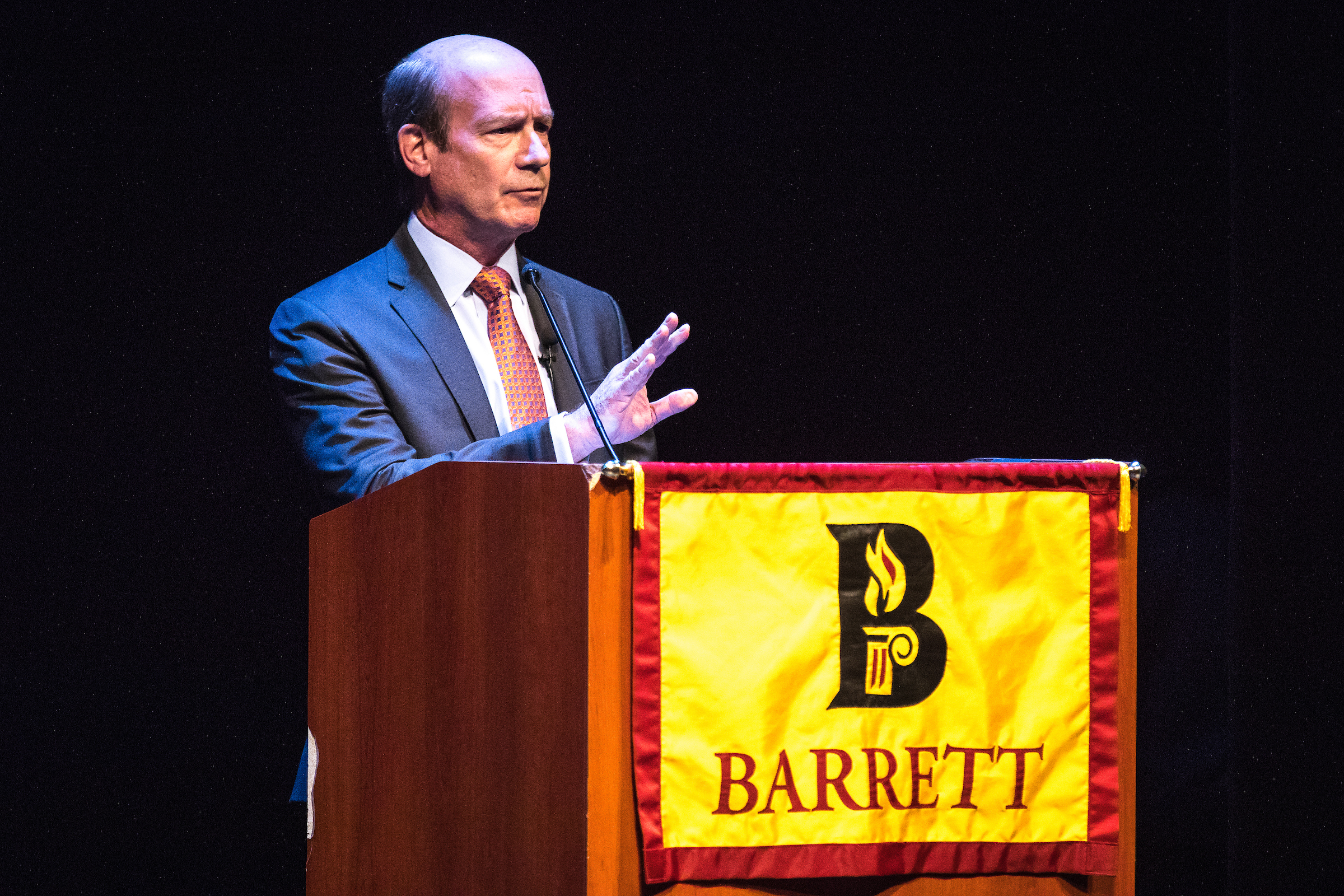Partisanship in Congress has grown so extreme that there is little incentive for elected officials to work together — and it might take a catastrophe for the situation to improve.
That was the view of two longtime Republican politicians from Arizona — Sen. Jeff Flake and former Sen. Jon Kyl — who both decried the lack of bipartisan cooperation during a talk at Arizona State University on Wednesday night.
“The culture rewards the extremes, and there is no market for being the one to compromise,” Flake said.
“Until voters will value that again, we’ll have the problems we do today.”
The two men spoke at Galvin Playhouse during the 20th annual John J. Rhodes Lecture in Public Policy and American Institutions, presented by Barrett, The Honors College at ASU.
Kyl said he fears a catastrophe due to the country’s lack of military preparedness.
“Or there could be an economic collapse,” he said. “Both of those are real possibilities because of decisions that have been deferred.”
The two blamed several factors on each party’s shift to its extremes.
“Social media has exacerbated it. It’s become easier for people to be in an echo chamber and only expose themselves to opinions they agree with,” Flake said.
“Also, the time it takes for somebody to have a thought and your fingers to type a message and for that to go out is not the equivalent of what needs to happen for major policy to be introduced,” he said. “And it makes it more difficult to pull back or compromise after that because you can’t take it back.”
Moderator J. Scott Rhodes talks about his father's impact on Arizona before welcoming Sens. Jeff Flake and Jon Kyl for their talk at the 20th anniversary John J. Rhodes Lecture on Wednesday. Photo by Charlie Leight/ASU Now
Kyl blamed cable news and talk radio for inciting conflict between the parties.
“The object of the person on TV is to get ratings so stations can get money. It’s not to educate,” he said.
The erosion of cooperation started happening several years ago, said Kyl, who served 18 years in the Senate and eight years in the House of Representatives. He retired in 2013.
“There are two kinds of members,” he said. “Those who are partisan and that’s it — they’re there to fight the other side. And those who are there to do good.
“I worked with Democrats for months on many things. We learned to trust each other, and that’s the key. It takes a long time to build that relationship.”
Both politicians said that it’s up to voters to change the course, and Flake said that he’s optimistic it will happen eventually.
“The longer I’m in Washington, even with the frustration I’ve experienced, you can see we have a good system. The pendulum swings and when one party takes it too far, it swings the other way.
“It’s a system that can withstand the foibles of the people who go through it.”
The talk was moderated by J. Scott Rhodes, the son of John J. Rhodes, an Arizona Republican who served in Congress from 1953 to 1983 and was the driving force behind congressional authorization of the Central Arizona Project. As minority leader of the House of Representatives, he was among a handful of Republicans who met with President Richard M. Nixon in 1974 to tell him that impeachment was imminent. Nixon resigned two days later.
“Watergate is a memory that is slipping away, but my father was under tremendous pressure during that time,” Rhodes said.
He asked Kyl and Flake to describe how members of Congress can work with a president they disagree with.
“You like to have good relationships. Your worst enemy today is the guy you need tomorrow,” Kyl said, noting that he didn’t recall a time when Presidents Bill Clinton, George W. Bush or Barack Obama threatened to damage him politically.
“I wish I could say I haven’t been threatened by the White House,” deadpanned Flake, a frequent critic of President Donald Trump.
“When the president has appointed a good, conservative judge, I’ve supported him. When he proposed a ban on Muslims, I’ve opposed him,” he said.
Earlier this month, Flake gave a fiery speech rebuking Trump in New Hampshire, site of the nation’s first presidential primary.
At the end of Wednesday’s event, an audience member called out, “Will you run for president?”
Flake smiled and said, “Next question.”
Top photo: Sen. Jeff Flake (left) and former Sen. Jon Kyl talked about the lack of bipartisan cooperation in Washington, D.C., during the John J. Rhodes Lecture at Galvin Playhouse on Wednesday. Photo by Charlie Leight/ASU Now
More Law, journalism and politics

CBS News, ASU Howard Center partner on investigation into police 'moonlighting'
A new, investigative series by CBS News and the Howard Center for Investigative Journalism at Arizona State University reveals the stark reality of the practice of letting police officers work off-…

How ASU is leading the national conversation on journalism and AI
As artificial intelligence continues to advance at a rapid pace, journalism faces both unprecedented opportunity and profound responsibility.At Arizona State University, those challenges are being…

5 takeaways about artificial intelligence and elections
Next year’s midterm elections are happening at a crucial time in the adoption of AI, with concerns that the new technology could pose threats to the process but also have the benefit of easing the…

